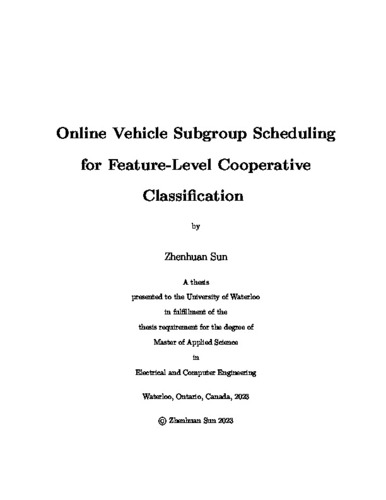| dc.contributor.author | Sun, Zhenhuan | |
| dc.date.accessioned | 2023-09-28 17:23:53 (GMT) | |
| dc.date.available | 2023-09-28 17:23:53 (GMT) | |
| dc.date.issued | 2023-09-28 | |
| dc.date.submitted | 2023-09-22 | |
| dc.identifier.uri | http://hdl.handle.net/10012/19978 | |
| dc.description.abstract | In future transportation systems, autonomous vehicles (AVs) are expected to operate under complex driving environments without human intervention. Their ability to continuously perceive and understand the surrounding environment can be realized through the execution of a range of environment perception tasks, including object classification, object detection, and object tracking. In this thesis, we investigate an autonomous driving scenario wherein a group of AVs is tasked with tracking a common object over a period of time. To tackle issues related to the inefficient utilization of global sensing data and excessive consumption of computing resource in conventional standalone tracking, a cooperative classification scheme has been proposed as a replacement for the conventional non-cooperative classification scheme employed in the tracking process. Taking into account the dynamic nature of operating environments and the varying availability of computing resources, a subgroup scheduling problem is studied to optimize the performance of the cooperative classification scheme. Our objective is to determine the composition and role assignment of each scheduled subgroup in order to minimize the total computation demand required by the group for performing cooperative classifications, while ensuring the satisfaction of classification accuracy and delay requirements. A learning-based solution is developed, which integrates multi-armed bandit (MAB) theory with distance and line-of-sight based subgroup selection criteria, to guide subgroup scheduling decisions in the presence of randomness and uncertainties. Simulation results confirm the effectiveness of our proposed scheme and algorithm, outperforming other baseline scheme and algorithms by delivering improved classification accuracy and reduced classification delays with lower computation demand. | en |
| dc.language.iso | en | en |
| dc.publisher | University of Waterloo | en |
| dc.title | Online Vehicle Subgroup Scheduling for Feature-Level Cooperative Classification | en |
| dc.type | Master Thesis | en |
| dc.pending | false | |
| uws-etd.degree.department | Electrical and Computer Engineering | en |
| uws-etd.degree.discipline | Electrical and Computer Engineering | en |
| uws-etd.degree.grantor | University of Waterloo | en |
| uws-etd.degree | Master of Applied Science | en |
| uws-etd.embargo.terms | 0 | en |
| uws.contributor.advisor | Zhuang, Weihua | |
| uws.contributor.affiliation1 | Faculty of Engineering | en |
| uws.published.city | Waterloo | en |
| uws.published.country | Canada | en |
| uws.published.province | Ontario | en |
| uws.typeOfResource | Text | en |
| uws.peerReviewStatus | Unreviewed | en |
| uws.scholarLevel | Graduate | en |

